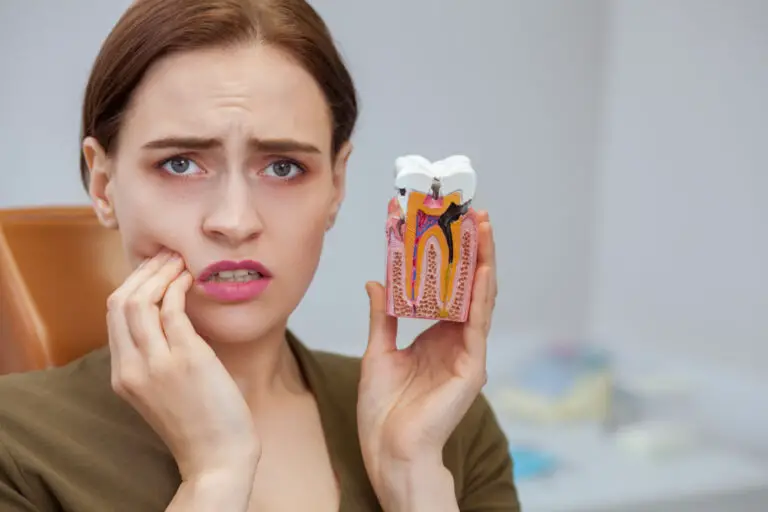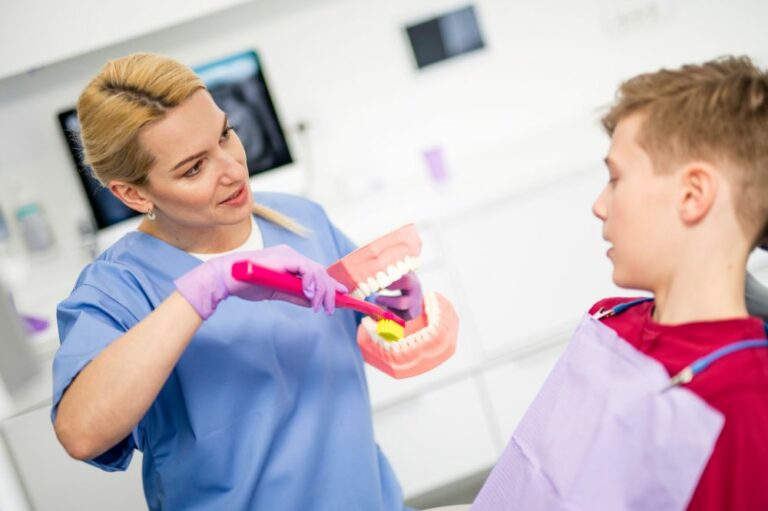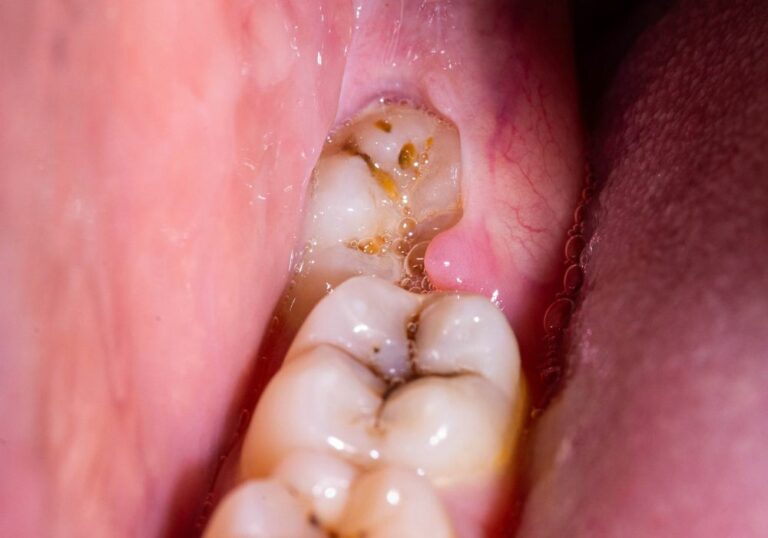Waking up to find your gums inexplicably sore and inflamed can be alarming. While occasional mild gum irritation is normal, frequent or severe gum pain indicates a problem needing attention. Understanding the most common reasons gums become aggravated, along with effective home remedies and professional treatment options, can help you find relief.
Common Causes of Sudden Gum Discomfort

A number of dental health issues and other factors can provoke gum inflammation and pain without warning. Being aware of the possible reasons can help you identify the source.
Gingivitis
Gingivitis, a mild form of gum disease caused by plaque buildup, is a leading culprit behind sore gums. Symptoms tend to develop slowly, but you may suddenly notice sensitivity, redness, or bleeding when brushing. Puffy, inflamed gums are classic signs of gingivitis.
While common, gingivitis is early gum disease that can be reversed with improved daily brushing and flossing. The condition is caused by accumulated bacteria in plaque infecting the gums. Telltale signs are bad breath and bleeding gums when you brush or floss. If gingivitis persists without treatment, it can advance to severe periodontitis and eventual tooth loss.
Periodontitis
Periodontitis represents advanced gum disease affecting the tissues and bone supporting teeth. Unlike gingivitis, periodontitis causes permanent gum and bone damage. There is usually a history of untreated gingivitis. Sudden symptoms may include painful gum swelling, receding gums, loose teeth, and intense throbbing.
Seeking immediate professional treatment is vital, as periodontitis can rapidly destroy gum tissues and jawbone. Aggressive cleaning below the gumline, antibiotics, and in some cases gum grafting surgery may help halt tissue destruction before tooth loss occurs.
Pregnancy Gingivitis
Pregnant women are prone to gingivitis due to amplified hormone levels that exaggerate inflammation and bleeding. Sudden gum sensitivity and swelling around the 2nd to 3rd month of pregnancy is common. Excellent oral hygiene and professional cleanings help control “pregnancy gingivitis” and prevent more serious infection.
Canker Sores
Canker sores are small round ulcers that frequently crop up on the gums. They have a red border and yellowish center. Canker sores are triggered by factors like stress, injury, illness, spicy foods, nutritional deficiencies, allergies, and gastrointestinal issues. Most clear up on their own within a week or two.
Ill-Fitting Dental Work
Dental restorations that do not fit properly often cause inflammation where they rub the gums. Gum pain from crowns, fillings, braces, or dentures may seem to occur suddenly once the irritant makes contact. See your dentist promptly for adjustments to relieve discomfort. Leaving problems unaddressed risks more serious tissue damage and bone loss.
Oral Cancer
Unexplained mouth pain including gum soreness can in some cases indicate oral cancer. Other worrisome symptoms are jaw stiffness, loose teeth, difficulty swallowing, and non-healing mouth sores. Oral cancer requires immediate diagnosis and treatment, so persistent gum pain warrants prompt medical attention.
Medication Side Effects
Certain prescription drugs are known to cause swollen, painful gums as a side effect. Common culprits include medications for high blood pressure, oral contraceptives, epilepsy, cancer treatment, and immune disorders. Review any new medications with your pharmacist and alert your dentist to unusual gum changes.
Vitamin Deficiencies
Vitamin C deficiency can compromise gum health, causing soreness and excessive bleeding. Even marginal deficiencies of vitamin D or B vitamins may leave gums irritated and tender. Boosting intake of vitamin-rich foods or targeted supplements can aid healing.
Blood Disorders
Gum pain and bleeding might result from blood disorders such as acute leukemia, idiopathic thrombocytopenic purpura, or hemophilia. Bleeding not alleviated by pressure requires prompt medical care to diagnose and manage any underlying health condition.
When to See Your Dentist About Sudden Gum Discomfort

Bouts of minor gum sensitivity or soreness typically do not require professional attention if they resolve within a week or so with diligent oral hygiene. But call your dentist right away if you experience any of the following:
- Bleeding not stopped by applying pressure for several minutes
- Rapid gum recession
- Persistent bad breath
- Throbbing or severe pain
- Pus around teeth and gums
- Gum swelling or sores
- Loose teeth
- Changes in bite alignment
- Numbness or tingling around mouth
- Difficulty eating, swallowing, or opening your mouth
Letting more serious gum issues go untreated allows them to progress, causing escalating damage. Even gum problems that seem minor deserve a proper diagnosis rather than ignoring discomfort and hoping it resolves on its own.
Diagnosing the Underlying Cause
Identifying the specific reason your gums are aggravated guides appropriate treatment. During your dental visit, expect your dentist to:
- Ask about symptoms, daily habits, medications, and health conditions
- Check for plaque, tartar, and signs of infection
- Evaluate gum recession, pocket depth, and loose teeth
- Examine any dental work for proper fit and alignment
- Assess damage from gum disease or trauma
- Take X-rays to check for bone loss under gums
More extensive testing such as gum biopsies or blood tests may be warranted based on examination findings and health history. An accurate diagnosis brings peace of mind regarding what is provoking your gum issues, and clarity on the best solutions.
Home Remedies to Soothe Sore, Inflamed Gums
While home treatments cannot resolve severe gum issues, they can provide temporary relief for mild cases of soreness or irritation. Options to try while awaiting your dental visit include:
- Saltwater rinses – Swish with warm salt water several times daily to reduce swelling and pain.
- Aloe vera – The soothing compounds in aloe vera gel ease inflammation when applied to irritated gums.
- Cooling rinses – Look for over-the-counter rinses with natural ingredients like herbs or tea tree oil to calm sore gums.
- Pain medication – Anti-inflammatories like ibuprofen or acetaminophen can relieve discomfort short term.
- Ice packs – Applying cold wrapped in cloth helps minimize swelling and tenderness.
- Dental wax – Coat sharp dental edges to prevent further injury to canker sores or abrasions.
- Soft foods – Stick to lukewarm soups, smoothies and other non-irritating foods until gums start healing.
Avoid hydrogen peroxide, alcohol, and harsh mouthwashes, as they may aggravate injured gum tissues. See your dentist promptly if discomfort worsens or persists beyond one week.
Professional Treatment Options for Sudden Gum Discomfort

Depending on the diagnosed cause, your dentist will provide appropriate treatment to resolve gum soreness and prevent complications. Customized treatment may involve:
- Deep cleanings – Removing plaque and tartar below the gumline treats gingivitis and can halt periodontitis progression.
- Medications – Antibacterial rinses or oral antibiotics combat stubborn infections causing gum inflammation.
- Dental work adjustments – Replacing or realigning fillings, dentures or other restorations prevents irritation.
- Gum grafting – Grafted gum tissues reinforce areas of recession for improved health.
- Nutritional guidance – Your dentist may recommend supplements if deficiency is weakening tissues.
- Oral cancer screening – If cancer is a concern, expect biopsy, imaging, and prompt specialist referral.
Follow all home care instructions provided after professional treatment to support healing. Report any complications or persisting symptoms at follow-up visits. Proper care restores gum comfort and health.
Help Prevent Sudden Gum Discomfort
You can minimize your risk of surprise gum issues by:
- Brushing thoroughly twice a day
- Flossing your teeth daily
- Rinsing daily with antimicrobial mouthwash
- Replacing worn toothbrushes every 3 months
- Scheduling regular dental cleanings and exams
- Watching for early signs of gum disease
- Having dental work adjusted promptly if it feels rough
- Managing health conditions like diabetes that affect gums
Excellent oral hygiene deprives bacteria of opportunities to infect vulnerable gum tissues. Quitting smoking and limiting alcohol also safeguard your gums against irritation and disease. Overall health influences gum health too, so proper nutrition, rest, and medication adherence all help keep your mouth comfortable.
When to Seek Emergency Dental Care
Though rarer, some persistent or severe gum symptoms warrant urgent dental attention. Seek emergency care for:
- Uncontrolled bleeding not stopped with pressure
- Rapid gum swelling or pus
- Severe throbbing pain
- Red, ulcerated gums
- Bad odor signaling infection
- Numbness or tingling around mouth
- Difficulty opening jaw fully
- Trouble chewing, swallowing, or speaking
These signs may indicate uncontrolled infection, abscess, oral cancer or other issues needing immediate treatment to prevent lasting oral damage or systemic illness. Bacteria and toxins from oral infections entering the bloodstream pose serious risks. Prompt professional intervention prevents more extensive complications when gum discomfort is alarming.
Answers to Common Questions About Sudden Gum Discomfort
Understanding more about gum pain can help you address the problem promptly and properly. Here are some frequently asked questions with answers:
Q: Why do my gums throb severely when I floss in one area?
A: Localized severe pain when flossing often indicates an abscess or pocket of infection that needs drainage. See your dentist urgently to treat the infected site before the problem worsens.
Q: What causes my gums to bleed a lot all of a sudden?
A: Sudden bleeding is primarily caused by inflammation from gingivitis. Other possible reasons include vitamin deficiency, blood disorder, medication side effects, or trauma. Identifying the source of bleeding is important to get it under control and prevent recurrence.
Q: Can my dentures be causing constant gum pain?
A: Yes, ill-fitting dentures are a frequent cause of gum irritation. The problem tends to worsen over time. See your dentist right away for adjustments or possible reline or remake of your dentures for a better fit to eliminate discomfort.
Q: Why do my gums hurt after I floss?
A: Healthy gums should not remain sore after flossing. Persistent sensitivity and pain indicates infected, inflamed gums needing treatment for disease. Improper flossing technique injuring gum tissues can also cause pain.
Q: Should I see a doctor if my gums stay sore?
A: Yes, visit your physician if professional dental treatment and excellent oral hygiene fail to resolve persistent gum discomfort. Thorough medical evaluation is needed to identify and manage any underlying systemic illnesses contributing to gum problems.
Q: What is the quickest way to relieve sore gums?
A: While not addressing the source, swishing with salt water, using oral pain relievers as directed, and cold compresses can provide temporary sore gum relief until proper dental treatment is obtained. Avoid alcohol and hydrogen peroxide.
The Bottom Line on Sudden Gum Discomfort
While gum pain can be alarming, the cause is usually identifiable and treatable. Practicing excellent oral hygiene plus getting regular professional care provides the best protection against sudden gum flare-ups. Pay attention to any changes in your mouth and seek help promptly for symptoms that persist or seem severe. With appropriate treatment, healthy gums feel comfortable again.






